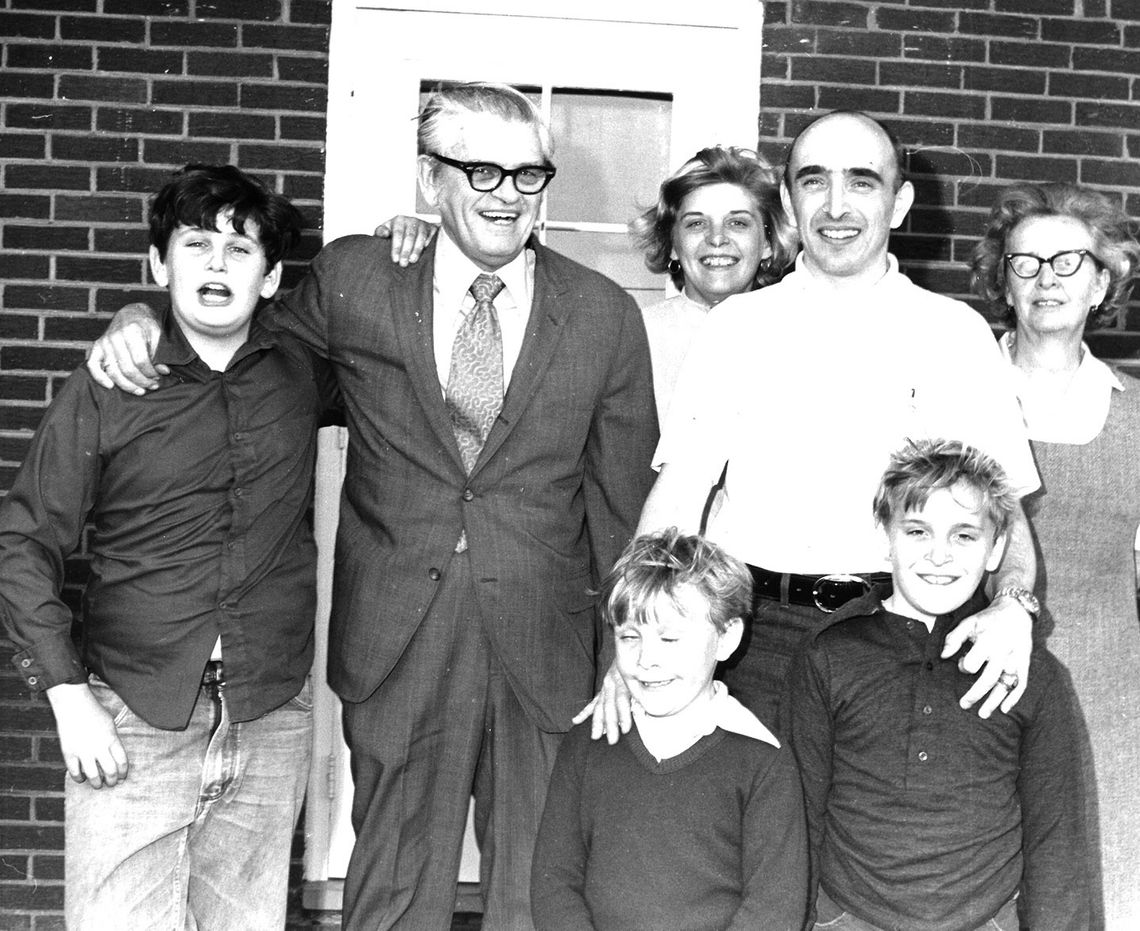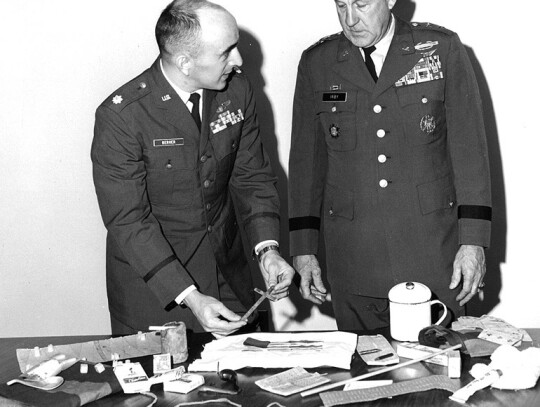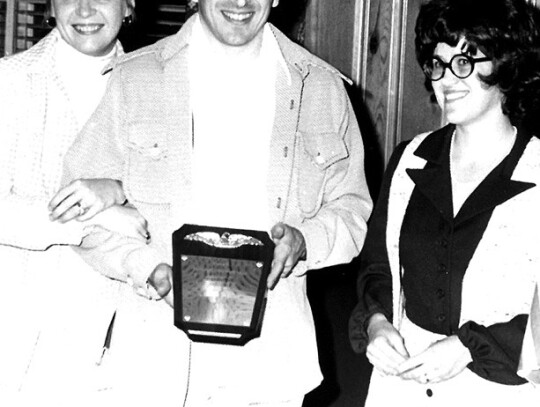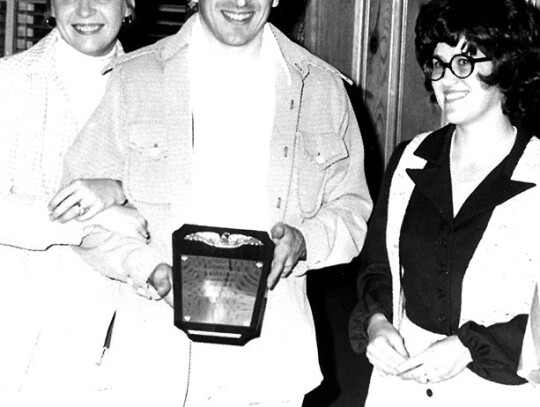Editor’s note: As we get ready to celebrate another Fourth of July, we thought we’d take a moment to reflect upon the sacrifices one of local residents made on behalf of our country over a half-century ago.
Air Force Maj. James R. “Jim” Berger spent over six years as a North Vietnamese prisoner of war after his FC-4 jet was shot down on Dec. 2, 1966. He was released 50 years ago this past February. His release made front-page news in The News-Gazette in the weeks that followed, including coverage of a talk he gave at Virginia Military Institute. The following is an account of that address published in the April 4, 1973, edition.
Berger would go on to run the Lexington Building Supply for many years. He died in October 2015 at the age of 76.
Fulfilling a promise to return to his alma mater and address the corps of cadets of the Virginia Military Institute after the release of all American prisoners of war held by the Vietnamese communists, Air Force Major James R. Berger, in a straightforward soldierly manner told his story of torture and mistreatment as a prisoner of war for more than six years in North Vietnam.
Asked afterwards why he and other POWS refused contact with various American peace groups visiting Hanoi during the period of his captivity he responded, “It was not what I felt my country wanted me to do.”
As to anti-U.S. statements and broadcasts that he made for the North Vietnamese, Major Berger said he was tortured seven times in what he termed the “rope” treatment. His arms were tied tightly behind his back then lifted away from his body with a rope going around his neck so that relaxation of the arm muscles choked him. These sessions lasted about one and a half hours each.
After four days of this the “meat” was torn away from his arms and the veins exposed. “I didn’t really quit but I did concede,” he said. “I gave them their statements and made one to three recordings a day for two years. If any one of you heard those broadcasts you could tell they were not made by a man talking of his own free will,” he continued. By being a poor performer, Major Berger hoped to make it not worth the effort on the part of his captors.
As a 1961 graduate of VMI Major Berger gave much credit to the self discipline and physical training he learned as a cadet which helped him live through his ordeal.
He announced an indefinite loan to the VMI museum of articles he had smuggled out of prison.
Among them were playing cards and dice he made, using toothpaste tubes for marking tools. Also included are two sticks which fit t ogether t o form a cross and a makeshift American flag which can be readily camouflaged as clothing articles.
Describing the North Vietnamese, Major Berger recalled one instance in which he was caught drilling holes through the foot thick walls in an attempt to communicate with other prisoners and was required to confess on his knees to the camp commander who tried to kick him. In a reflex action, Major Berger grasped the commander’s foot and a guard struck him in the left eye so hard that it was closed for 10 days.
As he returned to his cell a Vietnamese saw him and for a moment showed concern but a guard spoke to the man no doubt telling what had happened. The man then lost all concern.
Dogs kept in the camp by the guards were not handled as pets are in America. The guards would kick them and hit them with rifle butts and this was all a big joke. One dog had pups and they turned up in the soup fed to the prisoners.
He credited the American raid which attempted to free the POWs with improving morale because the North Vietnamese subsequently brought all the American prisoners together in the former French prison in Hanoi.
And he credited the American letter writing campaign with causing a change in the attitude of the North Vietnamese. Thereafter, the guards’ threats were not always carried out and the prisoners were able to stand up to them more.
In concluding his address to the cadet corps, Major Berger said that the VMI had meant a lot to him and it can help each cadet to be a better man. “If you seek the reason you will find the answers,” he said. A standing ovation of lengthy duration followed after which Maj. Gen. Richard L. Irby, VMI Superintendent, expressed his appreciation for the service to his country given by Major Berger.
At a brief press conference following the speech, Major Berger recalled the efforts of an American “peace” delegation offering him a letter from his wife to convince him that he should talk to them. He described this as a “dog biscuit” saying he only received nine letters from his wife, the former Carole Wright of Lexington, during the entire period of his captivity, the last being on Nov. 30, 1970.
Although any letter from his wife was precious he still felt it was his duty not to talk with any peace delegation. He told newsmen that the food received was poor but the prisoners ate anything possible to eat. Often the food contained rocks, nails, wire, glass, dirt and other filth.
Questioned about rebuilding North Vietnam, Major Berger said that if such aid could be used as a tool to educate the North Vietnamese he was in favor of this. Their ignorance is appalling, he continued, and they know only what is taught in their communist cadres. He said that the communist indoctrination is forceful, emotional and relies on ignorance.
Attempts were made to indoctrinate the POWS and this was a continuous thing with speakers in each room frequently putting out propaganda.
Major Berger said he received a communist newspaper once every four or five weeks called the Vietnam Courier. He said the English was most peculiar using nickel words in combination with five dollar words and it was hard to read. “I learned a lot of new words that way,” he said. Books were also given to the captive flyer and he remembered titles such as “Vietnam Today” and “Vietnam Women.” Asked the content of the latter, he replied, “It was all about women’s rights like this women’s lib thing I hear about here.”
After his leave is concluded Major Berger will report to Sheppard Air Force Base at Wichita Falls, Texas. He plans to continue his career in the Air Force as a flying officer. The Bergers have been visiting Mrs. Berger’s parents, Mr. and Mrs. Harry Wright here.
.jpg)





